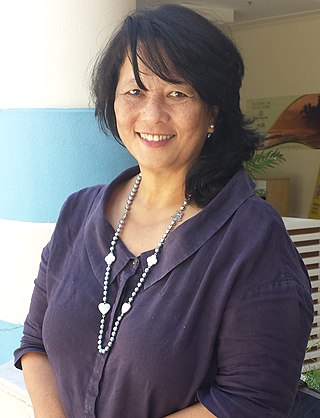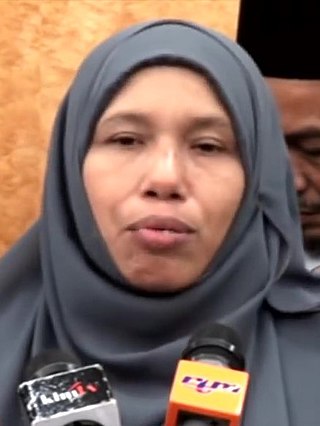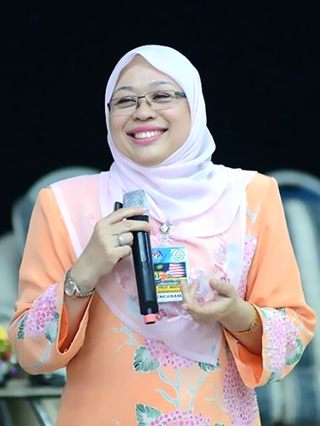Related Research Articles
The Constitution of Malaysia establishes a right to freedom of religion in Article 11. However, Islam is also established as the state religion of the country in article 3, and article 11 provides for legal restrictions on proselytizing to Muslims. According to Freedom House, the country was scored 1 out of 4 for freedom of religion, with 0 being the worst and 4 being the best, in 2023. Muslims themselves are subject to state enforcement of religious practices; they can be fined by the state for not fasting or praying, may be prohibited from converting, and only Muslims are considered to be ethnically Malay. Other religious communities are a large fraction of the population, while individuals with no religious affiliation are much rarer and can be viewed with hostility.

Islam in Malaysia is represented by the Shafi‘i school of Sunni jurisprudence. Islam was introduced to Malaysia by traders arriving from Persia, Arabia, China and the Indian subcontinent. It became firmly established in the 15th century. In the Constitution of Malaysia, Islam is granted the status of "religion of the Federation" to symbolize its importance to Malaysian society, while defining Malaysia constitutionally as a secular state. Therefore, other religions can be practiced legally, though freedom of religion is still limited in Malaysia.

Judiciary of Malaysia is largely centralised despite Malaysia's federal constitution, heavily influenced by the English common law, as well as Islamic jurisprudence.

Sisters in Islam (SIS) is a Malaysian registered company committed to promoting the rights of women in Malaysia. Its efforts to promote the rights of Muslim women are based on the principles of equality, justice and freedom enjoined by the Quran. SIS work focuses on challenging laws and policies made in the name of Islam that discriminate against women. As such it tackles issues covered under Malaysia's Islamic family and sharia laws, such as polygamy, child marriage, moral policing, Islamic legal theory and jurisprudence, the hijab and modesty, violence against women and hudud. It is noted for its Islamic feminist research and advocacy.
Lina Joy is a Malay convert from Islam to Christianity. Born Azlina Jailani on 28 July 1964 in Malaysia to Muslim parents of Javanese descent, she converted at age 26. The Lina Joy case sparkled a debate about apostasy in Malaysia, and her failed legal attempt to not have her religion listed as "Islam" on her identity card is considered a landmark case in Malaysia.
Moorthy Maniam, simply known as M. Moorthy, was a corporal in the Malaysian Army and a member of the first group of Malaysians to successfully climb Mount Everest. He was a Malaysian Indian, born and raised Hindu.

Lesbian, gay, bisexual, transgender, and queer (LGBTQ) people in Malaysia face severe challenges not experienced by non-LGBTQ residents. Sodomy is a crime in the country, with laws enforced arbitrarily. Extrajudicial murders of LGBTQ people have also occurred in the country. There are no Malaysian laws that protect the LGBTQ community against discrimination and hate crimes. As such, the LGBTQ demographic in the country are hard to ascertain due to widespread fears from being ostracised and prosecuted, including violence.

Islam is the state religion of Malaysia, as per Article 3 of the Constitution. Meanwhile, other religions can be practised by non-Malay citizens of the country. In addition, per Article 160, one must be Muslim to be considered Malay. As of the 2020 Population and Housing Census, 63.5 percent of the population practices Islam; 18.7 percent Buddhism; 9.1 percent Christianity; 6.1 percent Hinduism; and 2.7 percent other religion or gave no information. The remainder is accounted for by other faiths, including Animism, Folk religion, Sikhism, Baháʼí Faith and other belief systems. The states of Sarawak and Penang and the federal territory of Kuala Lumpur have non-Muslim majorities. Numbers of self-described atheists in Malaysia are few as renouncing Islam is prohibited for Muslims in Malaysia. As such, the actual number of atheists or converts in the country is hard to ascertain out of fear from being ostracised or prosecution. The state has come under criticism from human rights organisations for the government's discrimination against atheists, with some cabinet members saying that "the freedom of religion is not the freedom from religion".
The law of Malaysia is mainly based on the common law legal system. This was a direct result of the colonisation of Malaya, Sarawak, and North Borneo by Britain between the early 19th century to the 1960s. The supreme law of the land—the Constitution of Malaysia—sets out the legal framework and rights of Malaysian citizens.

Zainah Anwar is a prominent Malaysian non-governmental organisation leader, activist and Muslim feminist. She was the head of the civil society organisation Sisters in Islam for more than two decades before stepping down. In 2013 she was named by the International Museum of Women as one of its 10 most influential Muslim women.

Siti Zailah binti Mohd Yusoff is a Malaysian politician who has served as the Member of Parliament (MP) for Rantau Panjang since March 2008. She served as the Deputy Minister of Women, Family and Community Development for the second term in the Barisan Nasional (BN) administration under former Prime Minister Ismail Sabri Yaakob and former Minister Rina Harun from August 2021 to the collapse of the BN administration in November 2022 and the first term in the Perikatan Nasional (PN) administration under former Prime Minister Muhyiddin Yassin and former Minister Rina from March 2020 to the collapse of the PN administration in August 2021. She is a member and Women Chief of the Malaysian Islamic Party (PAS), a component party of the PN and formerly Gagasan Sejahtera (GS) as well as Pakatan Rakyat (PR) coalitions.

Women in Malaysia receive support from the Malaysian government concerning their rights to advance, to make decisions, to health, education and social welfare, and to the removal of legal obstacles. The Malaysian government has ensured these factors through the establishment of Ministry of National Unity and Social Development in 1997. This was followed by the formation of the Women's Affairs Ministry in 2001 to recognise the roles and contributions of Malaysian women.
Sharia means Islamic law based on Islamic concepts based from Quran and Hadith. Since the early Islamic states of the eighth and ninth centuries, Sharia always existed alongside other normative systems.
Zaleha binti Kamarudin is a Malaysian professor of law. She is Judge of Sharia Court of Appeal of Terengganu since 16 October 2017 and was the Rector of IIUM from 2 August 2011 to 31 July 2018.
Rohana binti Yusuf is the eleventh President of the Court of Appeal of Malaysia (PCA). She is the first woman to have been appointed into the office since its inception in 1994.
Polygamy is the practice of having more than one spouse at the same time. Specifically, polygyny is the practice of one man taking more than one wife while polyandry is the practice of one woman taking more than one husband. Polygamy is legal in Malaysia in the form of polygyny, that is, between one man and up to four wives. Special permission from an individual state's Syariah Court is required for each marriage after the first by fulfilling the requirements needed by the state's Syariah Law.

Shamrahayu binti A. Aziz is a law lecturer at the Ahmad Ibrahim Kulliyyah of Laws (AIKOL), International Islamic University of Malaysia (IIUM), Malaysia, and the incumbent Institution of the Malay Rulers Chair at Universiti Teknologi Mara (UiTM). She writes weekly as a columnist on the Malay daily newspaper, Berita Harian, as well as on her website. She does many research regarding Malaysian national affairs, the Malaysian Federal Constitution, Sharia law, and human rights. She is also a Principal Fellow at the Institute of Islamic Understanding Malaysia (IKIM).

Mohd Na'im bin Mokhtar is a Malaysian politician, lawyer and legal scholar who has served as Minister in the Prime Minister's Department in charge of Religious Affairs in the Anwar Ibrahim cabinet as well as a Senator since December 2022. He served as 4th Chief Judge of the Syariah Court from April 2019 to his appointment as a minister in December 2022. He is one of the two independent Cabinet ministers alongside the Minister of Finance II Amir Hamzah Azizan. He was the sole independent Cabinet minister before the 2023 cabinet reshuffle.

Pengiran Mohammad Tashim bin Pengiran Haji Hassan is a Bruneian politician and former syariah judge who served as the incumbent Deputy Minister of Religious Affairs (MoRA) since 2022. He is also a member of the Universiti Brunei Darussalam (UBD) council, Manpower Planning & Employment Council (MPEC), deputy chairman of Seri Begawan Religious Teachers University College and chairman of Badan Tanmiah Brunei.
References
- 1 2 "BBC 100 Women 2018: Who is on the list?". BBC News. 19 November 2018. Retrieved 21 November 2018.
- 1 2 3 4 5 6 7 Chia, Rachel Genevieve (20 November 2018). "Malaysian Syariah High Court judge named in BBC's list of world's 100 most inspiring women". Business Insider Singapore. Archived from the original on 13 April 2019. Retrieved 20 November 2018.
- 1 2 3 "One of Msia's first female Syariah High Court judges named in BBC's 100 Women list - Nation | The Star Online". www.thestar.com.my. 19 November 2018. Retrieved 21 November 2018.
- 1 2 3 4 Gooch, Liz. "The female face of Islamic law in Malaysia". www.aljazeera.com. Retrieved 21 November 2018.
- 1 2 Chen, Heather (20 November 2018). "The woman who decides if men can take a second wife". BBC News. Retrieved 20 November 2018.
- 1 2 "Malaysian shariah judge named one of BBC's top 100 women trailblazers". Free Malaysia Today. Retrieved 21 November 2018.
- 1 2 3 "For the first time, Malaysia's Shariah High Court appoints women judges - Firstpost". www.firstpost.com. Retrieved 21 November 2018.